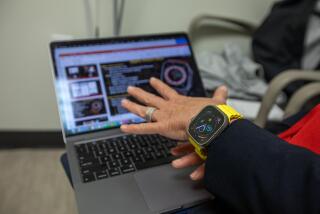Chart Doctors
- Share via
If you’ve ever made an appointment with a new doctor, asked your old doctor to forward your medical records, then shown up for your office visit to find that the records never arrived, you’re not alone.
Medicine is renowned for its use of high-tech gadgetry to treat the sick. But it is surprisingly backward when it comes to collecting and sharing data about what happens at doctors’ offices and hospitals or tracking how patients actually fare.
More than two decades after personal computers arrived on the scene, for example, most doctors still keep their patients’ records on paper.
Recognizing the problem, a group of California employers recently joined with several leading medical organizations representing HMOs, doctors and hospitals to develop an advanced data communications system for health care in the state.
A $1.2-million grant from the California Healthcare Foundation was awarded to the Pacific Business Group on Health, a coalition of 33 major California employers, and the National IPA Coalition, which represents doctor groups. Also involved in the effort are the California Assn. of Health Plans, representing HMOs; the California Medical Assn., representing doctors; the California Healthcare Assn., representing hospitals; and the American Medical Group Assn., representing managed-care medical groups.
The need to track medical information is becoming increasingly vital because of the demand by large employers for evidence of how medical quality has fared in an era of cost-cutting. They are finding, however, that the medical industry is poorly equipped to respond to the request.
“Every industry, including banks, has adopted some kind of computerized standard [for collecting data], and we can’t understand why health plans haven’t done it previously,” said David Hopkins, director of health information development for the employer coalition.
Hopkins says the San Francisco-based employer group believes that the health-care system’s lack of computer standards is wasting significant amounts of money. “Today, we have a bunch of proprietary systems that don’t communicate with each other,” he says.
Jack Lewin, executive vice president of the California Medical Assn., says that better medical data will be crucial to the success of doctors working in managed care in the future.
“Nobody has created a public utility model in which HMOs, doctors, hospitals and health-care purchasers actually collect information in a standard form and then compete based on medical results,” Lewin said. “If we can make it happen, the big winners will be patients.”
Lewin noted that one barrier to physician acceptance of such information systems is their fear that managed-care companies will use them “to scrape more profit out of physician practices instead of rewarding doctors” for better efficiency.
*
Times staff writer David Olmos can be reached by fax at (213) 237-7837 or by e-mail at david.olmos@latimes.com






